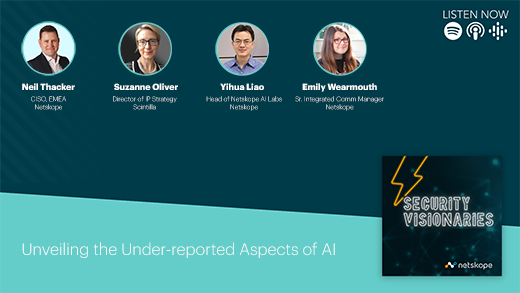Emily Wearmouth [00:00:01] Hallo und willkommen zu dieser Ausgabe von Security Visionaries, einem Podcast für alle, die in den Bereichen Cybersicherheit und Datenökosysteme arbeiten. Ich bin Ihre Gastgeberin, Emily Wearmouth, und diese Woche habe ich drei tolle Gäste, die drei verschiedene Perspektiven in eine Diskussion einbringen, die ich mit ihnen zum Thema KI führen wollte. Lassen Sie mich zunächst alle vorstellen. Erstens haben wir Yihua Liao, einen Datenwissenschaftler, der für alle großen Namen gearbeitet hat, eigentlich Facebook, Microsoft, Uber, und jetzt Leiter der AI Labs bei Netskope ist. Herzlich willkommen, Yihua.
Yihua Liao [00:00:31] Danke. Schön, hier zu sein.
Emily Wearmouth [00:00:32] Als nächstes haben wir Neil Thacker, Chief Information Security Officer und sehr erfahrener Datenschutzbeauftragter. Er hat mit großen Namen wie Swiss Re, der Deutschen Bank und der Lotteriegesellschaft Camelot zusammengearbeitet. Darüber hinaus war er als Berater für ENISA und die Cloud Security Alliance tätig. Willkommen, Neil.
Neil Thacker [00:00:49] Danke, Emily. Es ist mir eine große Freude, hier zu sein.
Emily Wearmouth [00:00:51] Und schließlich ist Suzanne Oliver heute unsere Expertin für geistiges Eigentum. Suzanne arbeitet in einer Privatpraxis als IP-Strategin und Anwältin bei Cintra. Sie leitete früher die IP-Abteilung bei ARM und ist auch in Westminster im Vereinigten Königreich keine Unbekannte, wo sie auf Regierungsebene eine Reihe von IP-Gremien sowie KI- und Machine-Learning-Verbänden vertritt. Ich traf Suzanne zum ersten Mal auf der London Tech Week, wo wir uns großartig unterhielten, während wir versuchten, höflich aus kleinen Lunchboxen aus Pappe zu essen. Daher freue ich mich sehr, dass sie heute bei uns ist, damit ich eine zweite Chance für einen ersten Eindruck bekomme. Willkommen, Suzanne.
Suzanne Oliver [00:01:23] Nun, danke. Und ja, es war ein tolles Mittagessen. Großartig. Vielen Dank.
Emily Wearmouth [00:01:28] KI ist also ein wirklich gehyptes Thema, und ich glaube, Sie werden kaum jemanden finden, der dieses Jahr nicht über KI gesprochen hat. Und Sie fragen sich vielleicht: Was können wir zu diesem riesigen Diskussionspool beitragen? Und genau das wollte ich heute tun. Ich wollte diese Frage an unsere Diskussionsteilnehmer weitergeben. Deshalb habe ich jeden von ihnen gebeten, sich darauf vorzubereiten, eine Frage von mir zu beantworten. Und diese eine Frage lautet: Was würden Sie inmitten all dieser Gespräche und des Hypes um KI wirklich gerne mehr diskutiert sehen? Jeder betrachtet dies aus einem etwas anderen Blickwinkel, also schauen wir uns ihre Antworten an. Und Neil, ich werde mit Ihnen anfangen. Es ist also ein bisschen wie ein Blind Date. Erste Frage an dich, bitte, Neil.
Neil Thacker [00:02:05] Ähm, ja, ich meine, das ist eine großartige Frage. Ich finde. Ich würde mir zum Beispiel wünschen, dass alle aufhören würden, „ChatGPT“ zu verwenden. KI und ML sind Synonyme. Ich denke, es hilft uns, davon wegzukommen, damit wir besser verstehen und uns der Allgegenwärtigkeit von KI heute bewusst werden. Ich denke, wir sagen im Allgemeinen, dass darüber im Allgemeinen zu wenig berichtet wird. Das ist so ähnlich, als ob jemand, wie wir es in der Vergangenheit erlebt haben, einer Organisation sagen würde: „Oh, wir verwenden zum Beispiel die Cloud“, aber in Wirklichkeit verwenden sie Tausende von Cloud-Apps und jede führt eine leicht unterschiedliche Aufgabe aus. Und ich glaube, dass wir mit KI vor derselben Herausforderung stehen. Es ist bereits weit verbreitet, sowohl in Organisationen als auch natürlich bei Verbrauchern. Sie nutzen diese Tools und Dienste. Das wäre also noch einmal die Nummer eins. Und natürlich ist es aus mehreren Schlüsselbereichen wichtig. Ich meine, zum einen ist da das allgemeine Bewusstsein für die aktuelle Nutzung von KI und zum anderen das Bewusstsein, dass es sich nicht um eine Zukunftstechnologie handelt. Es passiert heute. Zweitens müssen wir meiner Meinung nach die Menschen, die Art des Geschäfts und die Daten verstehen, damit die Verbraucher wissen, dass KI nicht nur eine bestimmte App ist. Das ist ein bisschen so, als würde man sagen, es sei ChatGPT. Ich meine, was ich am meisten hasse, ist, wenn ich jemanden über KI reden höre und er sagt, es sei KI, wie zum Beispiel ChatGPT. Es ist ein weit verbreitetes Missverständnis, dass es heute nur wenige Apps gibt, die KI-Funktionen nutzen. Es ist also in vielen der Apps enthalten, die wir heute verwenden. Es wird verwendet, es ist allgegenwärtig. Für Unternehmen und Verbraucher ist es von entscheidender Bedeutung zu verstehen, aus welchem Grund diese App und dieser Dienst verwendet wird, welche Daten verarbeitet werden und welches Ergebnis damit erzielt werden soll. Das sind also die wichtigsten Aspekte, die ich sehe.
Emily Wearmouth [00:03:48] Großartig, danke Neil. Ich sehe mir Suzannes Reaktion an und möchte Ihnen im Anschluss daran eine Frage stellen. Wer sollte Ihrer Meinung nach für diese Definitionen verantwortlich sein? Wissen Sie, Neil möchte nicht, dass es nur als ChatGPT definiert wird, oder gibt es eine gemeinsame Definition oder einen Standard für KI? Und wenn ja, wer besitzt es nicht oder wer sollte es besitzen?
Suzanne Oliver [00:04:07] Nochmals, eine wirklich gute Frage. Heute besitzt es niemand mehr. Und es gibt weitere Standards, die zur Beschreibung von Stufen verwendet werden, beispielsweise Autonomiestufen im Hinblick auf autonome Autos und Fahrzeuge. Und ich denke, diese Ära schreit geradezu nach etwas mehr Transparenz darüber, was KI ist und was nicht und was ML ist. Sie werden oft synonym verwendet, sind aber eigentlich sehr unterschiedlich. Ich glaube, es gibt viel Hype, und ich glaube, der Grund für den großen Hype liegt darin, dass es an Verständnis dafür mangelt, was diese Systeme können und was nicht. Auf der anderen Seite herrscht jedoch ein Mangel an Verständnis dafür, wem die Eingänge und Ausgänge gehören, um auf einen von Neils Punkten zurückzukommen, der auch mein größter Punkt ist. Ich glaube, Netskope hat in einem Ihrer Berichte die Menge an Quellcode hervorgehoben, die tatsächlich in diese Tools eingegeben wird. Proprietärer Quellcode kann auf ein mangelndes Verständnis zurückzuführen sein, dass diese Tools nicht den Anspruch erheben, dieses Geheimnis zu bewahren oder Ihnen zu erlauben, es als Ihr eigenes zu behalten. Und sie erheben auch Anspruch auf das Eigentum an sämtlichen Ergebnissen. Also der ganze Bereich der Transparenz darüber, wem was gehört. Wie heißt es und was macht es? Ich glaube, ja. Es ist vielleicht nicht richtig, eine Standardisierung vorzunehmen, aber vielleicht sollte eine New Sprache geschaffen werden, die uns hilft, diese Aspekte den Leuten, die sie nicht unbedingt sofort verstehen, klarer zu vermitteln.
Emily Wearmouth [00:05:35] Neil, haben Sie ein Beispiel? Sie sprechen davon, dass KI bereits allgegenwärtig ist und dass es sich um eine Technologie von heute und nicht von morgen handelt. Haben Sie Beispiele dafür, wo Sie KI in Aktion gesehen haben, bei denen die Leute vielleicht nicht wüssten, dass sie dort danach suchen sollen?
Neil Thacker [00:05:47] Ja, ich meine, wir haben die Einführung vieler KI-Assistenten gesehen, insbesondere bei Meetings und Videokonferenzen usw. Es kommt mittlerweile ziemlich häufig vor, dass ich an einem Meeting teilnehme und manchmal ein KI-Assistent den Platz von jemandem einnimmt, was immer interessant ist. Aber ja, es ist offensichtlich sofort so, ich meine, ich überprüfe die Teilnehmer an Besprechungen. Das tut nicht jeder. Nicht jedem ist bewusst, dass es einen KI-Assistenten gibt. Und ich denke, es ist, ich meine, es ist vielleicht okay. Zum Beispiel, wenn der Assistent Notizen macht und/oder vielleicht das Protokoll der Besprechung dokumentiert, was großartig ist, weil die meisten Leute das nicht gerne tun. Das ist also großartig. Lassen Sie uns diese Funktion automatisieren. Aber natürlich, wenn dieses KI-System eine zusätzliche Stimmungsanalyse durchführt, vielleicht untersucht es die Stimmung, vielleicht habe ich das gesehen, ich habe gesehen, dass dieser KI-Assistent alle 5 Sekunden eine Stimmungsbewertung durchführt, was mir ein wenig Sorgen bereitet. Ich meine, selbst bei uns gibt es einige Dienste, bei denen IQ-Messungen verwendet werden, also zugehört wird, wie die Leute reden und interagieren, und versucht wird, ihren IQ einzuschätzen. Wenn Sie so etwas in einer Besprechung tun, sollten Sie natürlich vorher jemandem Bescheid sagen, da dieser möglicherweise zuerst die Datenschutzrichtlinien des Anbieters, des Dienstanbieters, des KI-Assistenten, prüfen möchte. Vielleicht möchten Sie das gleich zu Beginn erklären. Wenn Sie also einen schlechten Tag haben, dann sind sie vielleicht ganz, ich weiß nicht. Ich meine, eines dieser Dinge ist, dass man irgendwann jemanden überrumpelt. Das ist zwar nur ein Beispiel, vielleicht ein grobes Beispiel, aber ich denke, dass wir hier die Fähigkeiten des Dienstes besser verstehen müssen. Es geht nicht nur um die Aufzeichnung und Erstellung von Besprechungsprotokollen. Da gibt es so viele Möglichkeiten. Und es macht den Leuten das bewusst. Als Beispiel: Ich bin zu einem Anbieter eines dieser Dienste zurückgegangen und habe ihn gefragt: „Okay, wie steht es um Ihre Datenschutzrichtlinien?“ Und ihre Antwort: Keine Sorge, sie ist vollständig abgedeckt. Und unabhängig davon ist dies die Zukunft. Also akzeptiere es einfach. Also läuten sofort die Alarmglocken. Natürlich, ich natürlich. Ich musste dann tiefer graben, um herauszufinden, was ihr Service genau bietet. Ich denke also, dass es für die Leute ziemlich schwer ist, das zu verstehen. Und manchmal ist es zu spät. Sie werden in Verlegenheit gebracht. Sie müssen eine schnelle Einschätzung und ein Urteil über diese Dienste abgeben. Also ja, es geht darum, dieses Verständnis wirklich zu begreifen. Auch hier ist möglicherweise ein gewisses Maß an Vertrauen seitens des Anbieters dieser Technologien und Dienste erforderlich.
Emily Wearmouth [00:08:12] Ich würde sagen, es ist ziemlich mutig, an diesem Punkt eine KI an Ihrer Stelle zu einem Meeting zu schicken. Es gibt viele Gespräche darüber, dass Menschen ihren Job verlieren werden, die diesen Weg freiwillig gehen, nicht wahr?
Neil Thacker [00:08:23] Ja, ich denke, die Herausforderung besteht darin, dass wir alle unseren eigenen KI-Assistenten zum Meeting schicken. Ich meine, worüber diskutieren sie? Ich wäre gern eine Fliege an der Wand.
Emily Wearmouth [00:08:30] Damit. Genial. Yihua. Ich wollte dich reinholen. An diesem Punkt arbeiten Sie viel an der Entwicklung von KI-Systemen und dem Schreiben von Modellen für maschinelles Lernen. Was halten Sie von der ständigen Umbenennung von allem in ChatGPT? Finden Sie das frustrierend?
Yihua Liao [00:08:49] Das ist es, wissen Sie, denn ich habe das Gefühl, dass AI-Washing definitiv ein Problem ist. Wissen Sie, es trübt das Verständnis von KI. Ich würde mir also auf jeden Fall mehr Diskussionen darüber wünschen, wie Sicherheitsunternehmen und vielleicht Technologieunternehmen im Allgemeinen KI und ML entwickeln, also was die Eingaben für das KI-Modell sind und was die Ausgabe ist und wie zuverlässig die Ausgabe ist. Rechts? Und ich habe das Gefühl, dass es in diesen Aspekten an Verständnis und Transparenz mangelt. Daher glaube ich, dass es einige Missverständnisse gibt. Wissen Sie, so wie ich das sehe, sagen manche Leute normalerweise: „Hey, ich kann alles.“ Wissen Sie, es wird uns unsere Arbeitsplätze wegnehmen und alles kontrollieren, was wir tun. Und dann gibt es auch Leute, die sagen: „Sie trainieren mit meinen Daten und ich möchte nicht, dass Sie meine Daten verwenden, um sich zu verbessern oder meinen Konkurrenten zu helfen.“ Ich denke, dass wir bei Netskope seit meiner Tätigkeit bei den Netskope AI Labs und im Laufe der Jahre tatsächlich viele KI-Fähigkeiten entwickelt haben, und zwar schon vor diesem ganzen allgemeinen KI-Hype. Vielleicht könnte ich Ihnen einige meiner Ansichten und die Art und Weise erläutern, wie wir bei Netskope Modelle für maschinelles Lernen und KI erstellen. Zunächst einmal haben wir bei Netskope tatsächlich viele KI-Modelle erstellt, darunter Modelle zur Identifizierung von Malware, Phishing-Websites und sensiblen Daten. Ich glaube, Suzanne hat den Quellcode-Klassifizierer erwähnt, das ist etwas, das mein Team tatsächlich vor ein paar Jahren entwickelt hat. Dann verwenden wir auch maschinelles Lernen, um anomales Benutzerverhalten zu erkennen, das auf einen Datenverstoß oder eine Insiderbedrohung usw. hinweisen kann. Was also auf einer hohen Ebene in unsere Modelle einfließt, sind die Daten, die wir aus unterschiedlichen Quellen zu sammeln versuchen, darunter Daten aus öffentlichen Domänen oder Daten, die wir von Dritten erworben haben. Daher würden wir niemals die Daten unserer Kunden ohne deren Erlaubnis zum Aufbau von Modellen für maschinelles Lernen verwenden. Sie können sich also vorstellen, dass wir für einige der Modelle des maschinellen Lernens, beispielsweise für die Analyse des Benutzerverhaltens, das normale Verhalten jedes einzelnen Benutzers betrachten müssen. Aber auch für ein solches Modell benötigen wir zunächst die Zustimmung unserer Kunden. Zweitens betrachten wir einige andere Informationen, die wir nicht betrachten. Wenn der Benutzer beispielsweise eine Datei herunterlädt, müssen wir uns nicht unbedingt den Dateiinhalt ansehen, um zu entscheiden, ob dieses Verhalten abnormal ist oder nicht. Rechts. Also, ja, das ist im Grunde das, was in das Modell einfließt. Nun zur Ausgabe des Modells. Und wissen Sie, es gibt viele, wissen Sie, heutzutage behauptet fast jedes Unternehmen, dass es KI einsetzt und wie genau die KI-Modelle sind. Aber ich würde sagen, wenn Ihnen jemand erzählt, dass seine KI hundertprozentig genau ist, dann würde ich sagen, dass er lügt. Wissen Sie, letzten Endes ist KI wirklich eine Wahrscheinlichkeitsrechnung, also wie wahrscheinlich es ist, dass etwas auf der Grundlage der vorhandenen Trainingsdaten passiert. Sie brauchen also immer entweder einen Menschen, der die Ausgabe des KI-Modells überprüft, oder vielleicht eine Art Feedbackschleife innerhalb Ihres Produkts, damit Sie dieses Feedback nutzen und Ihr Modell neu trainieren und mit der Zeit verbessern können. KI ist also wirklich ein innovativer Prozess. Es ist ein Prozess, und Sie können nie erwarten, dass das Modell beim ersten Mal 100 % oder sogar 99 % genau ist. Sie müssen im Laufe der Zeit immer iterieren.
Emily Wearmouth [00:13:30] Ich sehe viele zustimmende Nicken von Suzanne und Neil. Sie können gerne zu dem springen, was Sie hinzufügen möchten.
Suzanne Oliver [00:13:37] Ja, ich denke, dem Punkt der Zuverlässigkeit habe ich wirklich vehement zugestimmt, und ich denke, das liegt vor allem am mangelnden Verständnis, wissen Sie, ich weiß, das ist Neils größter Hass, wenn man von AI direkt zu ChatGPT wechselt. Dies ist an sich ein recht interessantes Beispiel, das verwendet werden kann, da es, wie Sie wissen, falsche Daten als richtig darstellt, weil es kein Verständnis für richtig und falsch bzw. wahr hat. Wissen Sie, es besteht lediglich die Wahrscheinlichkeit, dass dies die Antwort ist, nach der Sie suchen. So funktioniert es. Und ich denke, hier kommt mein früherer Punkt zu Bildung und Fähigkeiten zum Tragen, um zu verstehen, dass diese Dinge Werkzeuge sind. Und wie Menschen sind sie fehlbar, aber auf unterschiedliche Weise. Rechts. Und ich denke, wir als Gesellschaft müssen das deshalb ein bisschen besser verstehen. Aber der Punkt ist, wissen Sie, diese Transparenz darüber zu haben, wie wir sie beschreiben. Vielleicht müssen wir sie auf verschiedene funktionale Weise kategorisieren und die Risikoausgabe kategorisieren, wie die Autonomiestufen, die vorhin, aber ja, irgendwie ja, nicke, nicke vehement zustimmend.
Emily Wearmouth [00:14:54] Und Neil, ich wollte dich fragen und du hast noch etwas zu sagen, also antworte gerne auf beides. Aber ob einige der Punkte, die Yihua aufgegriffen hat, bei Ihnen als jemand, dessen Aufgabe es ist, Daten zu schützen, Anklang fanden? Welche Art von Fragen stellen Sie jemandem wie Yihua bei anderen Technologieunternehmen, um wirklich herauszufinden, wozu diese Systeme gebaut werden?
Neil Thacker [00:15:16] Ja, ich meine, es kommt immer wieder auf die Daten an, oder? Es geht also um Fragen dazu, was mit den Daten passiert, die im Rahmen einer Eingabeabfrage eingegeben werden. Wenn Sie beispielsweise genAI verwenden, wird das Modell verwendet, um zusätzliche Dienste privat oder öffentlich bereitzustellen, und es wird auch durch eine Analyse gesteuert. Und natürlich wurde dort noch einmal ein Beispiel für implementierte Organisationskontrollen erwähnt. Aber was passiert dann mit der Ausgabe? Wird für die Ausgabe irgendeine Art von Integritätsprüfung durchgeführt? Und kann die Ausgabe dann auch verwendet werden, um weitere Modelle durchzugehen und vorab zu trainieren? Rechts. Dies ist ein weiterer Aspekt, bei dem Sie natürlich eine Schleife einführen und die Ausgabeabfrage basierend auf einer Reihe von Feedbackschleifen unter Verwendung von KI-Diensten weiter ausnutzen und verfeinern können. Aber noch einmal: Es ist wichtig, das noch einmal zu verstehen: Wie alt sind diese Daten? Wie viele Iterationen durchlaufen diese Daten? Aber dann kommt es auch auf Dinge an wie, ich meine, zum Beispiel, welches Land? Ich denke, das ist etwas, worüber wir in naher Zukunft definitiv mehr Fragen stellen werden, da möglicherweise weitere Vorschriften zum Schutz des Einzelnen erlassen werden. Und wir würden hören, dass das EU-KI-Gesetz als Gesetz in Kraft treten wird, das die EU-Bürger schützt. Aber das bedeutet natürlich in der Regel, dass es eine Reihe weiterer regulatorischer Anforderungen und Vorschriften geben wird, die von anderen Ländern eingeführt werden, die weiterhin Geschäfte mit der EU machen wollen, und solche Dinge. Wir haben gesehen, dass die DSGVO ein Beispiel ist. Das sind also Dinge, die Sie beachten sollten. Ich möchte noch hinzufügen, dass wir uns, glaube ich, alle in diesem Gespräch und vielleicht auch andere, des Halluzinationsphänomens bewusst sind, bei dem KI gelegentlich einfach fantasievolle und kreative Inhalte erstellen kann. Und es basiert weder auf Fakten noch auf der Wahrheit. Ich habe dies kürzlich als Beispiel gesehen. Jemand fragte erneut: „Was ist der Weltrekord für die Überquerung des Kanals zu Fuß?“ Und es gab einen Namen, ein Datum und eine Überfahrtszeit an.
Emily Wearmouth [00:17:20] Das war mein Rekord, Neil.
Neil Thacker [00:17:21] Also ja, ich meine, 14 Stunden, 51 Minuten.
Emily Wearmouth [00:17:24] Es hat ewig gedauert. Ja, ja.
Neil Thacker [00:17:26] Aber manche Leute denken, na ja, vielleicht war es wieder richtig. Vielleicht hat tatsächlich jemand den Kanal überquert, beispielsweise durch den Kanaltunnel. Im Folgeinhalt hieß es dann jedoch, dass dies nur von professionellen Schwimmern versucht werden sollte. Man könnte also meinen, es handele sich um eine Halluzination. Das ist also nur ein Beispiel. Aber ja, ich denke, wir müssen uns der Daten, ihrer Integrität, ihres Schutzes und aller wahrscheinlich kommenden Vorschriften bewusst sein. Aber wir versuchen tatsächlich, die Bürger bei der Nutzung dieser Dienste und bei der Angabe, welche Daten tatsächlich verarbeitet werden, zu schützen.
Yihua Liao [00:17:59] Ja. Also, Neil, das ist so wahr. Ich meine, Halluzinationen sind sicherlich eine Herausforderung für Praktiker wie mich. Wir probieren viele New Dinge aus und versuchen, die Wahrscheinlichkeit von Halluzinationen zu minimieren. Aber ich möchte auch das erwähnen, wissen Sie, und das Thun hervorheben, das Sie vorhin erwähnt haben. Bei KI geht es wirklich um die Daten, richtig. Ihre KI ist so gut wie Ihre Trainingsdaten. Wissen Sie, wenn Sie keine zuverlässigen, qualitativ hochwertigen Daten haben, wenn Ihre Daten verzerrt sind und Ihr Modell nicht wirklich gut funktionieren wird, haben einige von Ihnen sicher schon davon gehört, dass einige der KI-Modelle zur Gesichtserkennung weniger genau sind. Und wenn es um dunklere Haut oder Frauen geht, gibt es in den Trainingsdaten eine gewisse geschlechts- und altersbezogene Verzerrung. Das ist also ein Problem für uns, also für Sicherheitsunternehmen wie unseres, weil wir bei den meisten unserer Modelle für maschinelles Lernen Dinge wie Alter, Geschlecht und andere PII-Informationen nicht berücksichtigen. Ich würde jedoch argumentieren, dass es dennoch möglich ist, dass das Training, das wir zum Trainieren unserer KI-Modelle verwenden, möglicherweise nicht das widerspiegelt, was wir in der realen Welt sehen. Als Datenwissenschaftler oder ML-Wissenschaftler versuchen wir immer, die Qualität unserer Trainingsdaten zu verbessern, damit sie repräsentativer für das sind, was wir in der realen Welt sehen.
Neil Thacker [00:19:44] Ja, ich meine, wir sehen zum Beispiel auch die gesamte Lieferkette und die Wirtschaftlichkeit der KI, nicht wahr? Es gibt Organisationen, die alle Daten bereitstellen, die für Schulungen zu solchen Dingen verwendet werden können, und dort beginnen wir auch, über Datenintegrität zu sprechen. Und woher diese Daten stammen, ist ein bisschen wie die Marketingdiskussion. Woher stammen diese Informationen? Wurde es mit Zustimmung eingeholt? All diese Dinge. Das führt also auch zu einer Diskussion, oder? Die gesamte wirtschaftliche Erhebung zur Lieferkette, aus der diese Daten stammen, und wer die Erlaubnis oder Genehmigung zur Verarbeitung dieser Daten erteilt hat. Rechts. Ich schätze, es gibt viele Anforderungen und Herausforderungen, die Organisationen bewältigen müssen, wenn sie beginnen, sich mit KI und deren Einsatz in ihrer Organisation zu befassen.
Emily Wearmouth [00:20:28] Auf jeden Fall. Und ich denke, das ist möglicherweise ein ganz guter Übergang zu Ihrer Antwort auf die Frage. Susanne. Wir hatten einen Vorchat, stellen Sie Ihre Antwort vor. Wie würden Sie die Frage beantworten? Was ist die eine Sache, über die Sie gerne mehr sprechen würden?
Suzanne Oliver [00:20:42] Ja, ich glaube, ich habe es bereits angesprochen. Es geht definitiv um die Transparenz dessen, was hineingeht und was herauskommt und wem das gehört. Ich meine, Daten an sich können nicht per se Eigentum sein, und das ist wahrscheinlich ein ganz anderes Thema, deshalb werde ich nicht näher darauf eingehen. Aber ich denke, ich baue auf Yihuas Punkt über unbewusste Voreingenommenheit auf. Sie wissen, dass wir Menschen mindestens 35 kognitive Verzerrungen haben, und ich hätte wahrscheinlich drei davon nennen können, wenn Sie mich vor diesem Anruf gefragt hätten. Wie können wir also erwarten, dass die in diese Tools eingegebenen Daten repräsentativ für uns sind, wenn wir uns selbst nicht einmal von Anfang an verstehen? Das ist also ein Element meiner Antwort auf mein Buch, sollte ich sagen. Die andere Frage ist, wem die Ausgabe wirklich gehört. Aus meiner Sicht berührt KI vor allem das Urheberrecht und den Besitz von Urheberrechten. Wenn ich beispielsweise einige Fotos in eines dieser Tools hochlade und es eine Art Änderung an einem meiner Fotos vornimmt, gehört diese Änderung möglicherweise dem Tool. Hier wären es beispielsweise OpenAI und ChatGPT, aber das Originalfoto gehört mir, sodass das Ergebnis beispielsweise ein New Werk ist, das aber möglicherweise eine Verletzung von etwas darstellt, das bereits zuvor geschehen ist, weil man bei der Verletzung auf die Vergangenheit blickt und die Innovation vorwärts geht. Auch hier handelt es sich um sehr schwierige Konzepte, die für Laien und Geschäftsleute gleichermaßen schwer zu verstehen sind. Aber es wird sehr wenig darüber diskutiert, es sei denn, Sie sind so ein bisschen ein IP-Freak wie ich. Und sicherlich ist die Sprache nicht einfach. Das Urheberrecht ist kein einfaches Thema, das man verstehen muss. Ich denke, dass wir als Technologieführer diejenigen sein müssen, die für mehr Transparenz in der Diskussion sorgen. Und das führt uns zurück zu dem Punkt, den ich vorhin angesprochen habe: Wir brauchen eine gemeinsame Sprache, die wir definieren, um über die eingehenden Daten, die ausgehenden Daten und das Tool selbst zu sprechen, damit wir einige der Vorgänge wirklich verstehen, überwachen und standardisieren können, um das Verständnis zu erleichtern.
Emily Wearmouth [00:23:04] Inwieweit versuchen wir aus Ihrer Sicht jetzt, den Stall zu schließen, nachdem das Pferd durchgegangen ist? Ich meine, Sie sprechen von Dingen wie „Facebook besitzt seit über einem Jahrzehnt meine Urlaubsschnappschüsse.“ Sie haben Glück. Für die Verbraucher hat es jedoch den Anschein, als sei das Pferd in Bezug auf das Eigentum an den Daten, die diese Systeme versorgen, in gewisser Weise durchgebrannt. Gilt das auch für Unternehmen oder besteht noch immer die Möglichkeit, die Tür zu schließen?
Suzanne Oliver [00:23:26] Ich bin nicht sicher, ob wir die Tür jemals schließen werden, aber ich denke, es hat keinen Sinn, dort zu sitzen und zuzusehen, wie das Pferd davonläuft und die Distanz zurücklegt. Ich glaube, es muss vielleicht ein bisschen eingepfercht werden. Und für mich ist es die Geschwindigkeit der Veränderung. Es liegt an der Geschwindigkeit des Wandels in den Organisationen, daran, dass sie nicht wissen, wo ihre wertvollen Daten sind, wer sie verarbeitet und wer sie in die Cloud hochlädt. Und Sie können nur Sie können nur meine Ausnahme verwalten. Aber Sie möchten nicht, dass diese Ausnahmen auftreten. Rechts. Ich denke, es geht wirklich darum, das Verhalten Ihrer Ingenieure und Ihrer Marketingleute zu verstehen und mit ihnen darüber zu sprechen, ob diese Tools großartig sind. Sie helfen Ihnen, Zeit zu sparen. Aber ist Ihnen klar, dass dieses Sekretariatstool, wenn es im Hintergrund läuft, auf einem Server in einem Land liegt, in dem Sie vielleicht gar nicht möchten, dass die Protokolle Ihrer monatlichen Vorstandssitzungen auf einem Server in diesem Land gespeichert werden, ganz gleich, wie viel Zeit Sie dadurch beim Schreiben dieser Protokolle sparen. Obwohl es einfach erscheint und ein effizientes Werkzeug zu sein scheint, gibt es tatsächlich auch Nachteile. Und es geht nur darum, das kleine bisschen Gehirnschmalz zu haben, um zu sagen: „Okay, wissen Sie, alles Positive muss einen Haken haben.“ Hier stellt Neil, worauf er vorhin angespielt hat, die Frage: „Okay, dieses Tool scheint wirklich effizient zu sein, aber warum ist es eigentlich kostenlos?“ Warum ist es billig? Warum ist es günstiger, als wenn jemand dort sitzt und das Protokoll schreibt oder weitergibt? Und es muss eine andere Seite der Gleichung geben. Und ich denke, Sie müssen sich diese Frage stellen.
Neil Thacker [00:25:15] Ja, ich denke, ich meine, eine meiner allgemeinen Sorgen ist, dass wir heute bereits sehen, dass Organisationen beispielsweise Fragebögen herausgeben, um den Einsatz von KI in einem Produkt oder einer Dienstleistung besser zu verstehen. Die Herausforderung besteht immer darin, dass ein Fragebogen in der Regel einmalig ist, beispielsweise zur Einführung eines New Tools oder einer New Technologie, beispielsweise im Zusammenhang mit KI, oder es kann sich um eine jährliche Überprüfung dieses Tools handeln. Aber ich denke, es muss immer eine Phase geben, in der wir dies fast regelmäßiger und kontinuierlicher tun, basierend auf der, wie Sie, Suzanne, hervorgehoben haben, schnellen Akzeptanz und dem schnellen Reifegradwachstum dieser Dienste. Ich meine, ein Tool, das Sie heute vielleicht übernehmen, wird in einer Woche, in zwei Wochen oder in einem Monat ganz anders aussehen, wenn New Funktionen und Möglichkeiten hinzugefügt werden. Es muss also fast eine kontinuierliche Beurteilung sein. Ich bin ein großer Fan davon, Apps und Dienste zu bewerten und auf dieser Grundlage Richtlinien zu definieren. Und es könnte zum Beispiel auch sein, dass sogar wir diese Herausforderung im Zusammenhang mit Apps und Diensten sehen, die kompromittiert wurden. Die von ihnen aufgestellten Regeln, die die Anbieter zum Schutz des Dienstes nicht aufstellen würden, wurden gebrochen. Wie die meisten Dinge, die Menschen hacken, werden auch Hacker sie hacken. Rechts. Sie müssen sich also auch dieser Dinge bewusst sein. Und ja, es gibt auch einige, ich meine, einige weit hergeholte Anwendungsfälle, bei denen möglicherweise Tools zum Einsatz kommen, die ethische Grenzen überschreiten und die beispielsweise von der Organisation oder ihren Mitarbeitern verwendet werden, und die möglicherweise gegen ihre eigenen Ethikrichtlinien verstoßen. Auch dieser Vertrauenswert muss also Teil dieser Beurteilung sein. Aus organisatorischer Sicht sollten Unternehmen daher versuchen, eine bessere Aufsicht und Governance für die Nutzung von KI-Diensten zu schaffen.
Emily Wearmouth [00:27:02] Ich habe Sie am Anfang gefragt, Suzanne, wer für die Definitionen und Standards verantwortlich sein sollte. Und in gewisser Weise ist dies eine Wiederholung der Frage, wer für die Rechtsprechung über derartige Entscheidungen verantwortlich sein sollte. Neil spielte auf die bevorstehenden KI-Gesetze der EU an. Und wir haben viele Regierungen auf der ganzen Welt erlebt, die versucht haben, den Eindruck zu erwecken, sie würden eine Führungsrolle bei der Entwicklung der KI übernehmen. Aber ist es realistisch gesehen etwas, das reguliert werden kann, oder sollte es von der Industrie kommen? Woher kommt Ihrer Meinung nach die Führung?
Suzanne Oliver [00:27:34] Ich persönlich denke, es funktioniert immer, wenn es aus der Industrie kommt. Aber letzten Endes bin ich der Meinung, dass die Normungsgremien wirklich gute Arbeit leisten. Die Autonomie dieser sechs Stufen, 0 bis 5, wird, glaube ich, von SEA verwaltet, einer Organisation für autonomes Fahren, wenn ich mich nicht irre. Das Internet wird derzeit von unabhängigen Stellen reguliert. Also, wissen Sie, ich würde für ein unabhängiges Gremium stimmen. Aber aus Branchensicht glaube ich nicht, dass ich sonst bleiben werde. Ähm, aber ich habe sicherlich – und es wurde auch gerade in diesem Gespräch erwähnt –, ich glaube, Yihua hat das Konzept des Greenwashing erwähnt. Ich glaube nicht, dass es eine Selbstzertifizierung sein sollte. Davon gibt es zu viel mit Kohlenstoff und Kohlenstoffkompensationen und solchen Dingen, die, wissen Sie, wir sind, wissen Sie, ich denke, ethisch, wissen Sie, grün oder was auch immer, mit einer Art Ethik-Technologie. Ich habe viel zu viele Startups gesehen, die einen ML-Algorithmus auf ihren Maschinen laufen haben und dann überall in ihren Pitch Decks, wissen Sie, wo meine Firma, meine Maschinen sind, wissen Sie, sie verwenden einen handelsüblichen Computer-Vision-Algorithmus. Ich denke, dass es auch niemandem hilft zu verstehen, was es ist, wozu es da ist und welchen Wert es bringt. Aber zu vielen Punkten, die sowohl Neil als auch Sie in diesem Gespräch angesprochen haben.
Emily Wearmouth [00:29:20] Yihua, wie sieht es mit Ihnen als Entwickler dieser Dinge aus? Wie viel Verantwortung sollten Ihrer Meinung nach die Entwickler selbst tragen und inwieweit ist das unfair? Und wissen Sie, es sollte Ihnen überlassen bleiben, Dinge zu schaffen, die wir als Gesellschaft im weiteren Sinne vielleicht regulieren.
Yihua Liao [00:29:32] Ich denke, wir als KI-Praktiker sollten auch viel Verantwortung tragen, wenn es um verantwortungsvolle KI geht. Hier bei Netskope haben wir ein internes KI-Governance-Komitee, das uns dabei hilft, die KI-Strategie festzulegen, die Überprüfungsprozesse einzurichten usw. Und jedes Mal, wenn wir mit der Arbeit an einer New Initiative oder einem New KI-Modell beginnen, müssen wir einen sehr strengen internen Sicherheits- und Datenschutzprüfungsprozess durchlaufen, Fragebögen ausfüllen und dann ganz klar darlegen, was in das Modell einfließt. Was ist das Modell, wie wird das Modell verwendet, gibt es irgendwelche Datenschutzbedenken und so weiter. Ich denke, nicht nur die Regierung und die Industrie, sondern auch jedes einzelne Unternehmen und alle KI-Praktiker sollten sich dessen bewusst sein und es ernst nehmen. Und um sicherzustellen, dass wir alle KI-Systeme oder -Produkte auf verantwortungsvolle Weise entwickeln können.
Emily Wearmouth [00:30:48] Danke. Das war eine gemeine Frage von mir, die ich Ihnen gestellt habe. Vielen Dank also, dass Sie sich dieser Sache angenommen haben. Mir macht dieses Gespräch wirklich Spaß und ich habe nicht den geringsten Zweifel, dass es wahrscheinlich noch viele Stunden so weitergehen könnte, wenn wir es uns gemütlich in einem britischen Pub gemütlich machen würden. Aber unser Produzent winkt mir gerade zu, und das ist mein Stichwort, um zu pfeifen und zu versuchen, euch fertigzumachen. Ich werde also versuchen, alles zusammenzufassen, und Sie können mich gerne unterbrechen, wenn ich etwas falsch mache. Ich denke, man kann mit Fug und Recht behaupten, dass es zwischen den verschiedenen Antworten, die Sie drei auf meine Frage gegeben haben, viele miteinander verwobene Fäden gibt, aber es scheint auch, als gäbe es viel Konsens. Und ich denke, Sie sind sich alle weitgehend einig, dass wir möchten, dass die Leute aufhören, ChatGPT, KI und ML als Synonyme zu verwenden. Also, Neil, wir alle unterstützen deinen Wunsch und werden versuchen, daran zu arbeiten. Auch wir sind bei dieser Diskussion selbst in die Falle getappt. Ich weiß nicht, ob Ihnen aufgefallen ist, dass ich mich in gewissem Maße auf dasselbe Beispiel bezog, aber wir müssen es besser machen. Und ich glaube, wir waren uns auch weitgehend einig, dass es für den amerikanischen Zuhörer von Vorteil wäre, wenn er mehr Details über die glänzende KI-Beschriftung hätte, die die Leute auf alles kleben, sei es um Presseaufmerksamkeit zu erregen oder hohe Bewertungen zu erzielen. So könnten Organisationen und Benutzer besser verstehen, wie viel Risiko sie bei ihren Bewertungen anwenden sollten und was sie trauen können und was nicht. Und dann denke ich, dass der letzte Punkt, den wir durchgehend angesprochen haben und der sich aus Ihrer Hauptantwort ergibt, Suzanne, darin besteht, dass wir definitiv von mehr Gesprächen über das Dateneigentum innerhalb der gesamten KI-Lieferkette profitieren würden, sowohl im Hinblick auf das, was hereinkommt, als auch auf das, was herauskommt. Es geht darum, in der Gesellschaft, in Unternehmen und bei Einzelpersonen ein besseres Verständnis dafür zu schaffen, wie diese Eigentumsdiskussion aussieht, damit die Menschen fundierte Entscheidungen treffen können. Aber wenn wir diese Liste durchgehen, wissen wir, wie viel wir tun müssen? Ich meine, es ist eine sehr bescheidene Liste.
Neil Thacker [00:32:36] Es klingt einfach.
Suzanne Oliver [00:32:37] Yeah, all solved. In one podcast.
Emily Wearmouth [00:32:41] Sie sollten uns öfter erwischen. Ich danke Ihnen allen für Ihre Zeit und für dieses interessante und, wie ich annehme, funktionsübergreifende Gespräch, bei dem Sie alle Ihre Sichtweise eingebracht haben. Und nun zu unseren Zuhörern: Ich möchte nur sagen, dass wir Sie das nächste Mal bei Security Visionaries sehen. Vielen Dank.
Yihua Liao [00:33:00] Danke.
Neil Thacker [00:33:00] Danke an alle.
Suzanne Oliver [00:33:01] Danke.






















)



